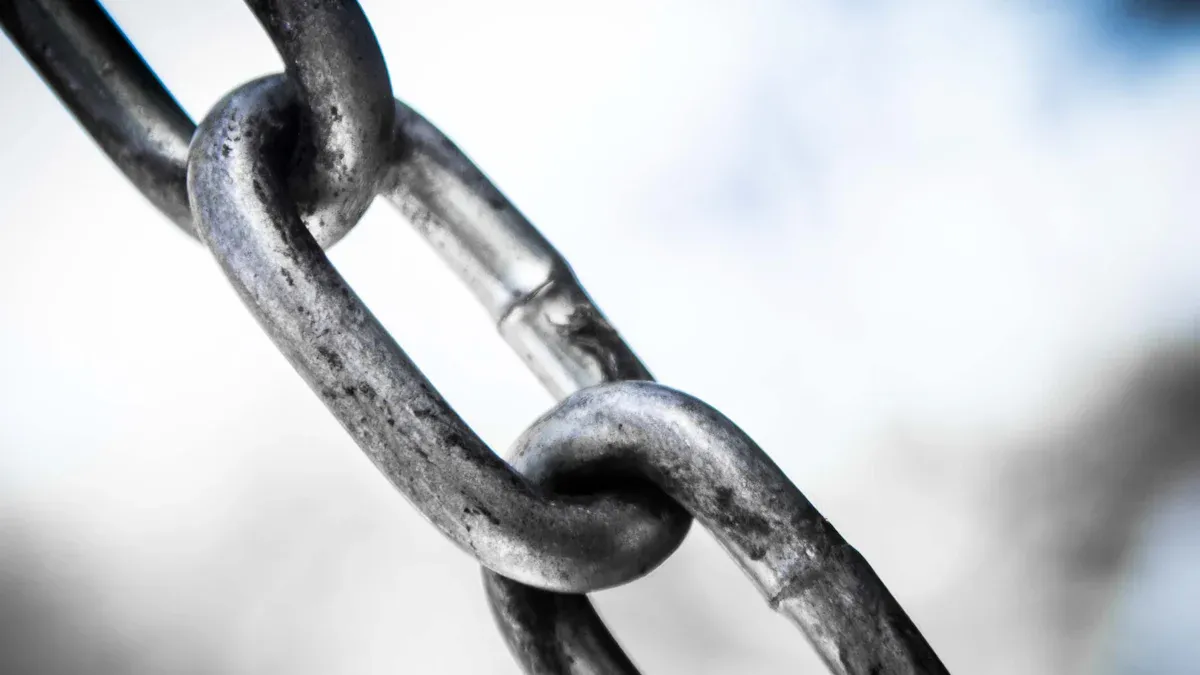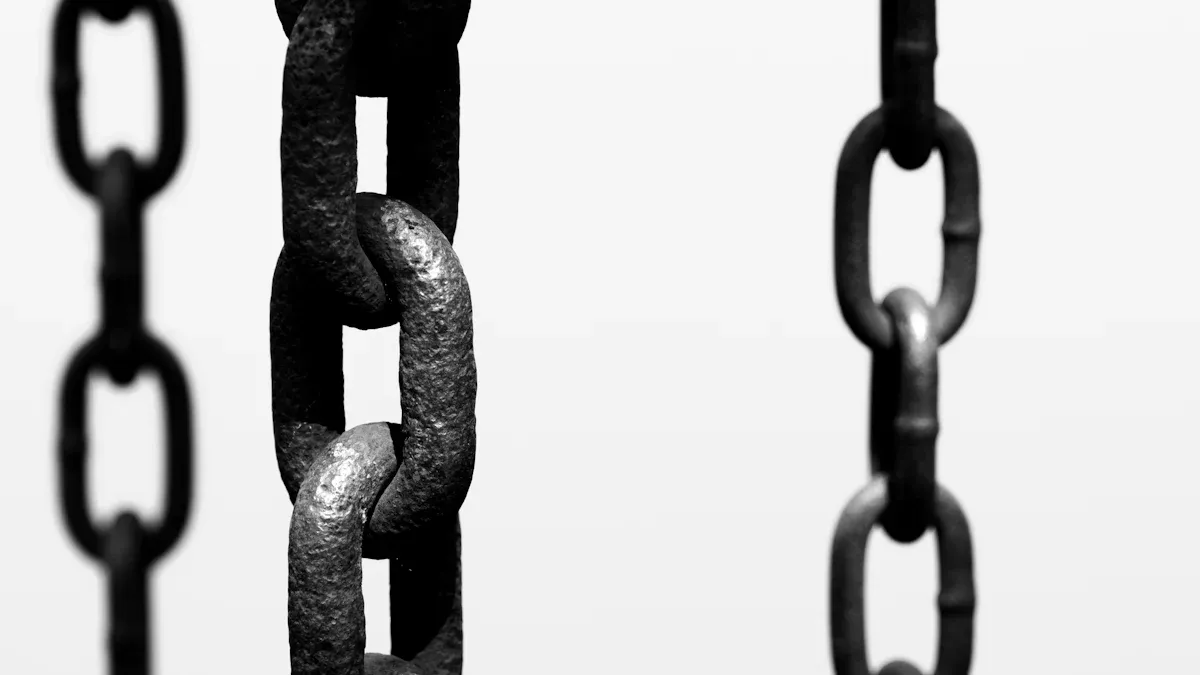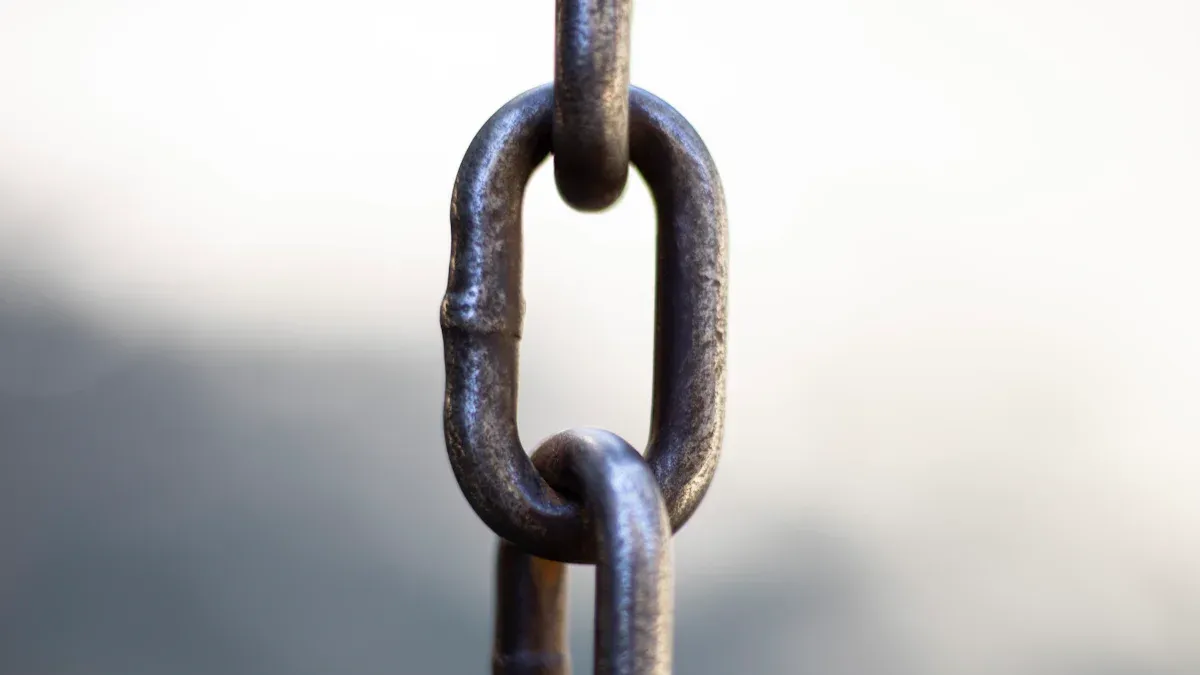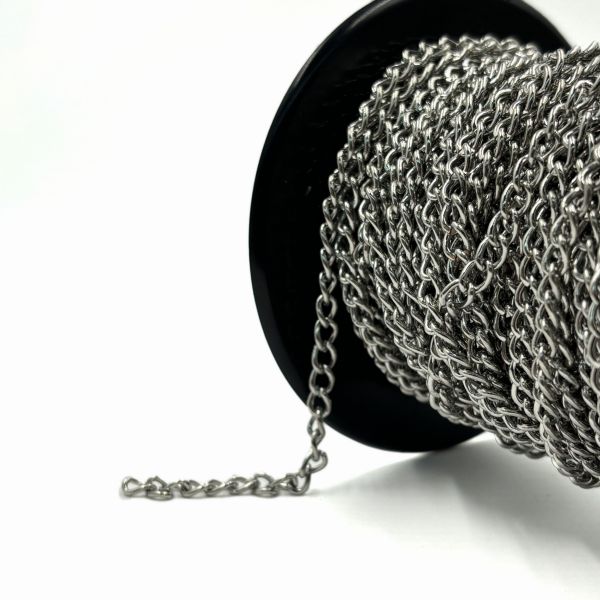Single Jack Chain Choices That Fit Your Needs

Choosing the right Single Jack Chain keeps your projects safe. Pick a chain that is strong but not too expensive. Strong materials last longer and don’t break easily. They also lower the chance of accidents. Make sure the material and design fit your needs. This choice affects safety and saves money over time.
Tip: Think about where you’ll use the chain. For outdoor use, pick one that won’t rust.
Principais conclusões
- Pick the best material for your Single Jack Chain. Stainless steel is tough and resists rust, while galvanized steel is cheaper for lighter tasks.
- Know how much weight your chain can handle. Always check the breaking point and safe weight limit to keep your projects safe.
- Think about how long your chain will last. Spending more on a strong chain can save money on fixes later.
- Choose a trusted seller. Read reviews and check if they are certified to get good-quality chains that are safe.
- Check for custom options. Custom sizes and finishes can make your chain fit your project better and look nicer.
Material Types

Stainless Steel Chains
Stainless steel chains are strong and don’t rust easily. They work well indoors and outdoors. This material lasts a long time and stays reliable. It’s also easy to clean, which makes it great for places like hospitals or food factories. Stainless steel chains are perfect for projects needing durability and hygiene.
Galvanized Steel Chains
Galvanized steel chains are affordable and good for light jobs. They have a zinc coating that helps prevent rust. Hot-dip galvanized chains are tougher and last longer. After years, they may need replacing or re-coating, which costs extra. Thicker coatings, over 100 microns, make them last longer. These chains cost less than aluminum but need more care over time.
Brass and Aluminum Chains
Brass chains resist rust and wear, making them good for decoration. They also conduct electricity well but are heavier and softer than aluminum. Aluminum chains are light and don’t rust because of their protective layer. They are weaker than steel but need less upkeep. Here’s a simple comparison:
| Material | Strengths | Weaknesses |
|---|---|---|
| Latão | Rust-resistant, durable, and conducts electricity | Heavy, soft, costs more |
| Aluminum | Lightweight, rust-resistant, protective layer | Weaker, pricey, needs special tools |
Think about your project needs when picking brass or aluminum chains.
Resistência e durabilidade

Capacidade de carga
It’s important to know a chain’s load capacity. This shows how much weight it can safely hold. Manufacturers give two main numbers: breaking load and working load limit. Breaking load is the most weight the chain can take before snapping. Working load limit is the safe weight for regular use.
Here’s a simple chart for light-duty chains:
| Load Type | Value |
|---|---|
| Breaking Load | 115 lbs |
| Working Load Limit | 29 lbs |
Always pick a chain that matches your project’s weight needs. For example, if hanging a light, check its total weight. Make sure it’s under the working load limit. This keeps the chain safe and lasting longer.
Resistance to Wear and Tear
Chains used often can wear out over time. Choose a chain that resists wear to avoid replacing it often. Strong materials like stainless steel or galvanized steel are good options. These materials handle friction and stay strong after many uses.
Check your chain regularly to spot damage or thinning. Pay attention to connection points where wear happens most. Using the right chain for the job also helps it last longer. A light-duty chain won’t hold up well with heavy loads.
Corrosion Resistance for Outdoor Use
Outdoor chains face moisture, sun, and temperature changes. Without protection, they can rust and weaken. Stainless steel chains are great for outdoors because they don’t rust. Galvanized steel chains also work well due to their zinc coating.
In humid or coastal areas, aluminum or brass chains are better. They resist rust naturally and need less care. To make your chain last longer, clean it often. Store it in a dry place when not using it.
Pricing and Value
Cost Differences Between Materials
The price of a Single Jack Chain depends on its material. Stainless steel chains cost the most because they are strong and rust-free. Galvanized steel chains are cheaper and good for light tasks. Brass and aluminum chains are mid-priced options. Brass looks fancy, while aluminum is light and doesn’t rust.
Here’s a simple cost comparison:
| Material | Price Range (per foot) | Key Features |
|---|---|---|
| Aço inoxidável | $1.50 – $3.00 | Strong, rust-proof |
| Galvanized Steel | $0.50 – $1.50 | Cheap, rust-resistant |
| Latão | $1.00 – $2.50 | Fancy, durable |
| Aluminum | $1.00 – $2.00 | Light, rust-proof |
Think about your budget and what the chain will do. Spending more now on a strong chain can save money later.
Evaluating Value for Money
Getting good value means balancing price and quality. A cheap chain might break or wear out quickly. For example, galvanized steel costs less but may need replacing often outdoors. Stainless steel costs more but lasts longer and needs less care.
Tip: Don’t just look at the price tag. Think about how long the chain will last. A durable chain saves money on repairs and replacements.
Pick a chain that fits your project’s needs. This way, you get the best use for your money.
Bulk Purchasing and Free Shipping Options
Buying in bulk can save you a lot of money. Many sellers lower prices when you buy more chain. For example, buying 100 feet instead of 10 feet often costs less per foot. Some sellers also offer free shipping for big orders, saving even more.
Find sellers with clear prices and shipping details. Ask about discounts or free shipping for large orders. Bulk buying is smart if you have many projects or need extra chains later.
Note: Check the seller’s return policy before buying a lot. This way, you can return unused chains if needed.
Supplier Reputation and Reliability
Picking the right supplier for your Single Jack Chain is important. A good supplier gives you strong, reliable chains. Here’s how to check if a supplier is trustworthy.
Reading Reviews and Feedback
Start by checking what other buyers say. Look for comments about product quality, delivery speed, and service. Good reviews mean the supplier can be trusted. Check testimonials on their website, but also look at independent review sites for a fair view.
Tip: Notice how they handle problems. Quick, helpful replies show they care about customers.
Certifications and Standards
Certifications show the supplier follows safety and quality rules. Look for suppliers with ISO or similar certifications. These prove the chains are safe and made well. Certified suppliers often share detailed product info to help you decide.
If you need chains for special jobs, like food or construction, check if the supplier meets those specific rules. This ensures the chains work for your project.
Customer Help and Support
Good customer service matters a lot. A reliable supplier answers questions fast and clearly. They help you pick the right chain and assist after you buy.
Note: Test their service by asking a few questions first. A friendly and clear reply is a good sign.
Choosing a trusted supplier saves money and avoids bad products or delays.
Customization and Availability
Custom Sizing Options
Sometimes, standard chain sizes don’t work for your project. You might need a chain cut to a specific length or with special link sizes. Many suppliers can customize chains to fit your needs. For example, if you’re hanging a light or securing a sign, the wrong chain size can cause issues. Custom sizing makes sure the chain fits perfectly, improving safety and looks.
When asking for custom sizes, check how precise the supplier is. Some use advanced tools for clean cuts and even link shapes. Always ask about the shortest or longest chain they can make. This helps avoid delays or getting the wrong size.
Tip: Measure your project carefully before ordering. Exact measurements save time and prevent mistakes.
Surface Finishes and Coatings
The finish on a Single Jack Chain affects how it looks and lasts. Chains with coatings stay strong and resist damage. For example, zinc coatings on galvanized steel stop rust, and powder coatings add color and protection. Stainless steel chains often have a shiny finish, making them great for decoration or professional use.
Pick a finish based on where you’ll use the chain. Matte finishes reduce glare outdoors, while glossy finishes look nice indoors. Some suppliers even offer custom colors to match your design.
Note: Ask your supplier how to care for different finishes. Proper care helps your chain last longer.
Lead Times and Stock Availability
Getting your chain on time is important for tight schedules. Before buying, check how quickly the supplier can deliver and if they have the chain in stock. Popular sizes and materials are often ready to ship faster. Custom orders may take more time.
If you need a chain quickly, look for suppliers with fast shipping options. Big orders might take longer, so plan ahead if you need a lot. Good suppliers give clear timelines and updates about your order.
Tip: Always check stock levels before ordering. This ensures you get your chain when you need it.
Choosing a Single Jack Chain takes careful thought. Don’t just pick the first one you see. Look at the material, strength, price, and if it can be customized. These things help the chain work well for your needs. It might need to be strong, resist rust, or fit your budget.
Tip: Think about what your project needs, like weight limits or outdoor use. Then, find suppliers who sell good-quality chains you can trust.
Buying a strong and reliable chain saves money and time later. Always choose quality over cheap options for better results.
PERGUNTAS FREQUENTES
What can you use a Single Jack Chain for?
Single Jack Chains work well for light tasks. Use them to hang signs, hold decorations, or support small items. They are not made for heavy loads or safety-critical jobs.
How do I pick the best material for my chain?
Think about where and how you’ll use it. For outdoor projects, choose stainless steel or galvanized steel to avoid rust. For decoration, brass or aluminum is a good choice. Match the material to your project’s needs.
Can I make a Single Jack Chain shorter?
Yes, you can cut most Single Jack Chains with bolt cutters or a hacksaw. Measure carefully before cutting to avoid mistakes. Some sellers also offer custom lengths for exact sizing.
How can I keep my chain in good shape?
Wipe your chain often with a damp cloth to clean it. For outdoor chains, add a protective coating if needed. Store unused chains in a dry spot to stop rust or damage.
Are Single Jack Chains strong enough for heavy loads?
No, Single Jack Chains are only for light-duty use. Always check the weight limit given by the maker. For heavy loads, use stronger chains like welded link chains.
Tip: Always pick a chain that fits your project’s weight and conditions to stay safe.




Thank you for your sharing. I am worried that I lack creative ideas. It is your article that makes me full of hope. Thank you. But, I have a question, can you help me? https://accounts.binance.com/vi/register?ref=MFN0EVO1
Thank you for your sharing. I am worried that I lack creative ideas. It is your article that makes me full of hope. Thank you. But, I have a question, can you help me? https://accounts.binance.info/register-person?ref=IHJUI7TF